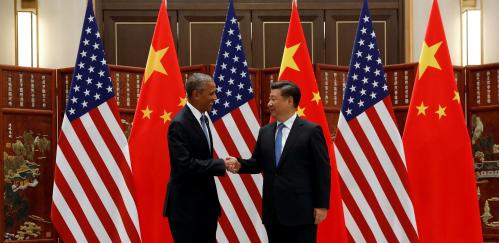Contradictory forces at this weekend’s G-20 summit in Hamburg, Germany, will likely mean that news media and protesters focus on debates and issues beyond the control of Germany, the host government, despite careful preparations. Expect street protests against capitalism while officials struggle to strengthen the capacity of market economies to deliver better social outcomes and to maintain progress on financial regulatory reform.
Big power tensions will be on display, even though security issues are not at the top of the agenda. Trump and Putin will meet; the two lone rangers will share more in style than in substance. Saudi Prince Mohammed bin Salman and Turkish President Recep Tayyip Erdogan are also likely to be outside the mainstream; oil and climate change will prove to be an incompatible mix; and the North Korean threat will expose awkward fissures in Asia-Pacific. German Chancellor Angela Merkel and French President Emmanuel Macron will stand out as the dynamic duo, supplanting and outshining the Merkel-Sarkozy dance of old. The G-20 Chair in 2016, President Xi Jinping of China, will want to project his leadership vis-a-vis the world economy and climate change.
China stands to gain stature, as U.S. President Donald Trump seeks to “represent Pittsburgh rather than Paris,” withdraw from world trade commitments, and play the “America first” role. This marks a sharp shift in atmospherics, since, up to now, those playing by the rules rather than against them have led the G-20, working within the system rather than outside it, and strengthening the global system rather than weakening it.
These machinations will serve as a theatrical backdrop, overshadowing substantive deliberations and debates on issues like climate change and trade, where deep differences exist. Earlier G-20 themes of inclusive growth, sustainable development, trade expansion, and financial stability have been transformed since the United Kingdom Brexit vote a year ago June, which solidified a growing sentiment in the U.S. and other countries that the global economy serves the few rather than the many.
This preoccupation is shifting the G-20’s focus, and a new narrative on sustainable globalization is being reimagined in the following ways:
- Inclusive growth is not just about how to adjust macroeconomic policies to generate more jobs, but how to achieve structural changes that produce more economic security, greater equality, and social inclusion.
- Sustainability is not just about how to manage environmental challenges, but is increasingly seen as requiring holistic, integrated approaches to many sectors of the economy, segments of society, and diverse dimensions of environmental imbalances.
- Making the global economy, trade, and financial systems serve people and society rather than only grow the economy may become the new mantra for managing the global economy.
In other words, we are witnessing a pivot from maximizing economic growth to reshaping the patterns of growth to achieve better social and environmental outcomes.
How much time G-20 leaders will have in Hamburg to explore these new dimensions and dynamics remains to be seen. But it is already clear within the G-20 preparatory processes among leading think tanks, business, labor, and civil society groups that the challenges now facing the global community are more interrelated, more synergistic, and more sweeping in terms of their social effects than previously realized. The rise of populist authoritarianism in response to them creates a new moment in global governance.
The central challenge now is the fact that the market economy has not produced social outcomes that are politically sustainable. Tackling this won’t be easy. Governments alone can’t do it; constrained fiscal room and policy space limited by deficits and debt mean that most governments are unable to directly stimulate the transformation of economies to generate better social outcomes through public policy instruments. But G-20 leaders and governments can lead a transformation process.
Business and the private sector have the greatest stake in maintaining public confidence in the market economy. In more than half of the G-20 countries, centrist leaders, many with business experience themselves, are in power.
This political moment opens the potential for engaging national leaders of governments, business, labor, and society in a transformative effort to make the economy serve society.
Effective transformation requires businesses with long-term strategic plans that reach forward to the future, horizontally out into their communities and outward to the world. “Sustainability is good business” is a principle that succinctly links private sector firms to the universally endorsed United Nations Sustainable Development Goals (SDGs) for 2030. The fact that the SDGs exist at this moment provides a framework that can be used to mobilize society, business, labor, and government toward common goals for the common good.
Initiating structural transformation of the economy to serve people, reshaping government-business-labor-society relations to generate sustainable pathways for the future, and meeting the urgent and emergent needs of people and society for economic security, opportunity, and empowerment are fundamentally political responsibilities for national leadership. Indeed, these new thrusts reflect the German G-20 presidency’s priorities on resilience, sustainability, and responsibility. G-20 summits are appropriate forums for demonstrating global and national political leadership for responding to the new political context in which people want to regain control of their destinies.
The urgent need to respond to public anger and disappointment puts pressure on G-20 leaders to reframe globalization and G-20 efforts to manage the global economy. The traditional focus on the international coordination of macroeconomic policies needs to be tempered by the emerging need to focus on the how to overhaul domestic policies to improve their social impact. Foreign policy, international coordination, and external relations are yielding to the primacy of generating better domestic social outcomes that are politically sustainable.
For the people of the world, let alone the people of G-20 countries, a concerted long term effort to transform the economy to serve people and society would be a welcome new focus for this and future G-20 summits.
The Brookings Institution is committed to quality, independence, and impact.
We are supported by a diverse array of funders. In line with our values and policies, each Brookings publication represents the sole views of its author(s).









Commentary
The Hamburg G-20 summit: Reshaping the economy to serve people and society
July 5, 2017